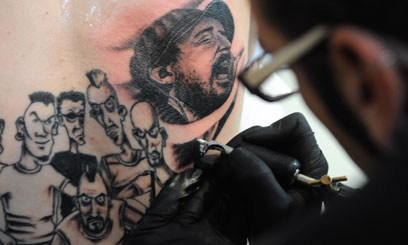Alcohol tests performed on nearly 2,000 young men and women frequenting bars in the west of France showed a strong correlation between body art and boozing, they said.
“Pierced and/or tattooed individuals had consumed more alcohol in bars on a Saturday night than patrons in the same bars who were non-pierced and non-tattooed,” said a study for the journal Alcoholism: Clinical and Experimental Research.
Previous research had shown that people with tattoos and piercings were more likely to engage in unsafe sex, fighting and heavy drinking, but this was the first such project to measure more alcohol per litre of exhaled breath.
The subjects were tested as they left 21 bars in four cities on four different Saturday nights on the Atlantic Coast of Brittany, an area with high alcohol consumption, said the researchers.
The men and women were asked whether they had tattoos or piercings and then asked to take a breathalyser test.
Tattoos and piercings are relatively new phenomena in France, and under-18s need permission from their parents.
The men tested were on average 20.6 years old and the women 20.2 years.
Of 1,081 men interviewed, 903 had no body art and an average measure of 0.18 milligrams of alcohol per litre of exhaled air, lower than France’s 0.25 drink driving limit.
The figure increased to 0.19 in the 98 men with tattoos, 0.23 percent for the 53 men with piercings, and 0.26 for the 27 men with both.
Of the 884 women, 537 had no body art and an average alcohol measure of 0.12, which rose to 0.14 for the 124 with tattoos, 0.20 for the 138 with piercings, and 0.24 for the 85 women with both tattoos and piercings.
Researcher Nicolas Gueguen of France’s Universite de Bretagne-Sud, said the findings showed that teachers, parents and doctors should consider tattoos and piercings as potential “markers” for alcohol abuse.
But fellow scientist Myrna Armstrong from Texas Tech University, who reviewed the paper, cautioned against a “tendency to see a tattoo or piercing and automatically profile or stereotype that individual as a ‘high-risk person’.”










































